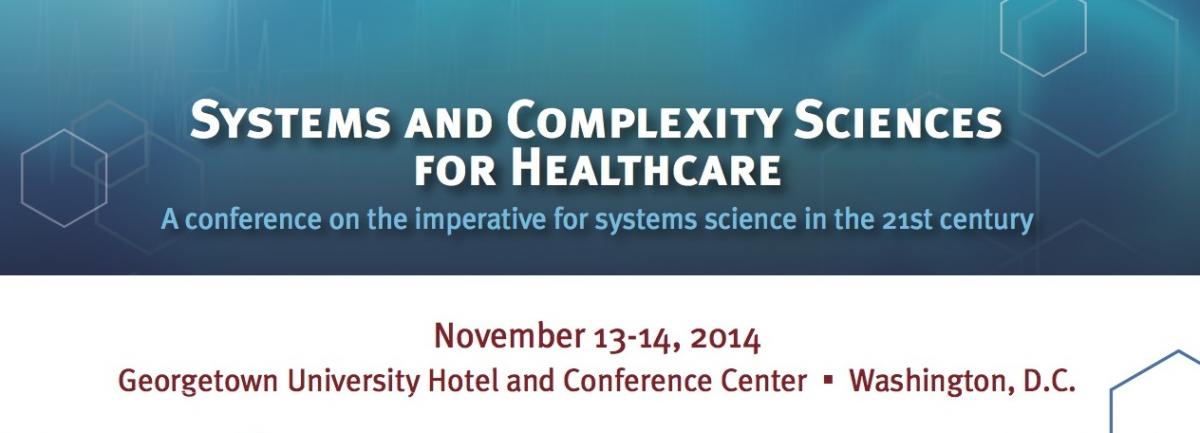International Meeting to Promote Systems and Complexity in Medicine

Posted in GUMC Stories
AUGUST 28, 2014—Georgetown is hosting a pioneering international conference in November that aims to promote a new way to practice medicine—combining the ethos of early medical wisdom with advanced tools and knowledge of modern medicine.
The conference, “Systems and Complexity Science for Healthcare: A conference on the imperative for systems science in the 21st century (new window),” is co-chaired by Howard J. Federoff, MD, PhD (new window), executive vice president for health sciences at Georgetown University Medical Center, and Joachim Sturmberg, MD, PhD (new window), associate professor of general practice, at The Newcastle University, in Newcastle, Australia, with participation from a variety of international experts in the field.
It will take place Nov. 13-14 at the Georgetown University Hotel and Conference Center, on Georgetown’s campus. Besides Federoff and Sturmberg, preeminent speakers include: Carmel Martin, MD, PhD (new window), of Trinity College in Dublin; Andrew Seely, MD, PhD (new window), of Ottawa Hospital Research Institute; Bruce West, PhD (new window), of Duke University; Henry Heng, PhD (new window), of Wayne State University; Fred Hafferty, PhD (new window), of the Mayo Clinic; and Georgetown’s own Kevin FitzGerald, SJ, PhD (new window).
Embracing Integration
The setting is appropriate for a conference that espouses a systems-based approach to health care, given GUMC’s long-time commitment to the credo of cura personalis, says Federoff.
The approach views health as a reflection of each person’s unique circumstances, including physiology, environment and community, defying an overly reductionist trend in medicine over the past century and an increasing sub-specialization of care.
“That resonates perfectly with our focus on thinking beyond reductionism, considering integration, complexity, and the whole patients and their families and their environment,” says Federoff. “In the same way that you can’t know how a machine operates by just looking at a single part, you cannot understand the disorders a person has, or may be developing, by examining one organ.”
Systems and Complexity Science
Since taking the helm at GUMC in 2007, Federoff has instituted a focus on systems medicine, which has since been incorporated into the medical school curriculum and a new master’s degree program, among other initiatives.
Systems medicine views dynamic systems of the human body as part of an integrated whole that incorporates biochemical, physiological and environmental interactions. Health and disease are influenced by many factors inside and outside the body, which may act independently and interact in complex ways.
Federoff’s vision builds on a movement that began in Europe several years ago that posits that “systems and complexity science” should be at the root of health care — a shift from reductionist medicine to examining overall systems behavior to make sense of the dynamic influences on health and disease.
Stopping Disease Before it Starts
The November conference will be the first global meeting on the issues involved in turning medicine around, 180 degrees, to consider this new holistic approach.
“This is a unique conference, the first one that focuses on complexity in the health field,” says co-chair Sturmberg. “This topic excites many who care about the future of medicine, and it will be a great forum to exchange ideas with colleagues worldwide.
“We need a new way of thinking about how the interactions of the different parts that lead to health or disease function, and then how we use this knowledge to practice medicine that will keep people healthy,” he says.
This entails looking at health and disease through an entirely new framework, Federoff says.
“You have to start thinking about the well individual, not just when something is not right with a patient,” Federoff says. “Well people have preclinical disease that goes unrecognized, and it is our job to understand that and prevent the disorder from developing.”
If physicians can decode all of the variables in a young person that could later affect health — environmental exposure, genetic predispositions and biological makeup, lifestyle, social and community environment — “we would have an enormous opportunity to provide very effective primary prevention, at low cost, that forestalls the emergence of disease,” Federoff says.
The conversation at the conference will be directed at how to organize such an effort to change medicine, and what tools will be needed, he says.
Change, however, will begin with medical students, residents, and clinical and research fellows, Federoff adds.
“As we do at Georgetown, rather than teach these students about molecules exclusively, we need to tell them about systems-level thinking.”
Registration is required for this conference and space is limited. Please visit http://complexityandhealth.georgetown.edu (new window) for detailed information on the agenda and how to register. While abstracts are closed for oral presentations, they are still being accepted for poster sessions.
By Renee Twombly
GUMC Communications
